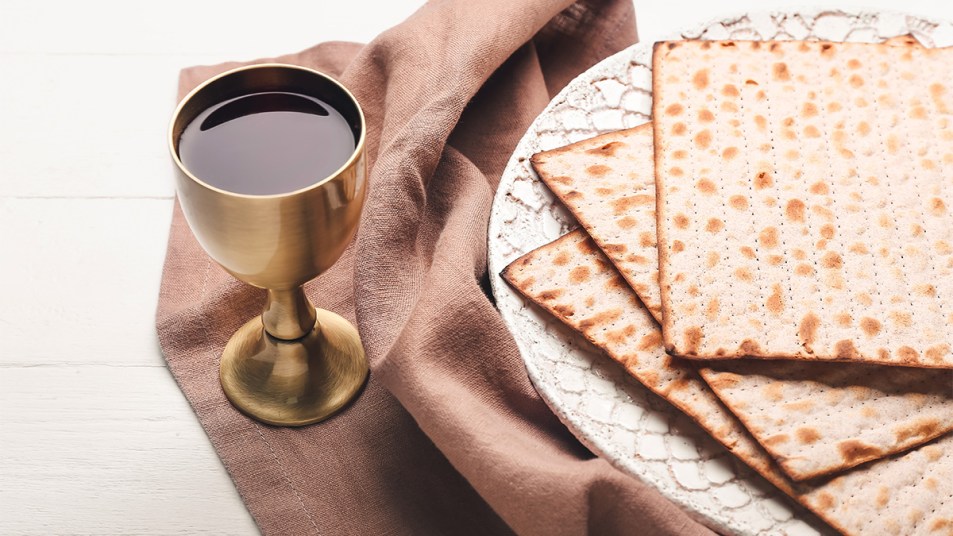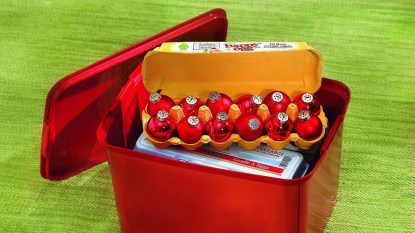What Is Kosher Wine — And Why Do People Drink It During Passover?
Let's uncork the significance of kosher wine.

Meat, fish, and dairy are all items that can be certified as kosher — but it doesn’t end with food. Wine can also be kosher, as long as it follows Jewish dietary laws. Kosher wine is available throughout the year, but it takes center stage during Passover Seder; Passover is a Jewish holiday that begins this year at sundown on April 5 and ends on April 13. Part of this religious feast entails each adult drinking four cups of wine, often a red variety, to symbolize the four expressions of deliverance found in the Bible’s book of Exodus. Curious about the difference between kosher wine and “regular” wine? Keep reading to learn what kosher wine experts have to say about it — plus, get some wine recommendations if you’re attending a Passover Seder this year.
The Difference Between Kosher Wine and Non-Kosher Wine
Between kosher and non-kosher wine, the main difference lies not in the appearance or taste, but rather in the winemaking requirements. “There’s a common ‘urban legend’ that wine is rendered kosher after being blessed by a rabbi — that is incorrect,” explained Jay Buchsbaum, Executive VP Marketing and Director of Wine Education at Royal Wine Corp. “For a wine to be made kosher there are strictly supervised purity guidelines that need to be followed from the moment the grapes enter the winery to when the wine is bottled.”
Buchsbaum also notes that a rabbi oversees this process for most kosher varieties to ensure that the following criteria are met:
- The wine contains only kosher ingredients such as a natural or special type of yeast and fining agents.
- No artificial colors or preservatives are added to the wine.
- Equipment that’s rabbinically-certified to solely make kosher wines is being used.
- The drink is handled by Sabbath-observant Jewish people.
Kosher wine is only allowed to be handled by non-Jewish people during the winemaking process if it’s “mevushal” (Hebrew for “cooked”). Mevushal wine must be heated to at least 185 degrees Fahrenheit — typically using a flash-détente machine. The result: A rich, fruity wine where the flavors aren’t destroyed by the heating process. Mevushal kosher wine can be served by anyone, while non-mevushal wine is strictly for Sabbath-observant Jewish people to open and pour.
So, the type of kosher wine a person buys boils down to their religious constraints. When shopping for kosher wine, you should remember that it can usually be identified by a “U” with a circle on the label. An encircled “U” and a capital “P” typically signals that the wine is kosher for Passover — meaning it hasn’t come in contact with any dough, bread, or grain. Passover wine is a great host or hostess gift if you’re attending a Seder, so keep reading to learn about several specific picks.
3 Passover Wine Recommendations To Try
Choosing a kosher wine may feel overwhelming due to the seemingly endless options — but it doesn’t have to be. “Some of the top producers are creating award-winning varietals at every price point, and with Passover just around the corner, we want to take the guesswork out of buying wine,” said Gabriel Geller, Director of Public Relations and wine expert at Royal Wine Corp.
Of Geller’s 15 recommendations for Passover wines, these three fit any budget and flavor preference:
- Elvi Sangria Red (Buy from WineWarehouseStore.com, $11.99): This mevushal wine features light and sweet fruity flavors with a berry finish. Best served chilled, it pairs well with meat, pasta dishes, and dessert.
- Barkan Platinum Cabernet Sauvignon (Buy from KosherWine.com, $29.99): Aromas of blackberries and black cherries grace this mevushal, medium-acidity wine. The spice and basil flavor notes make it ideal to enjoy alongside beef, lamb, or poultry.
- ESSA Emunah 2020 (Buy from KosherWine.com, $39.99): This dry red blend boasts the flavor of ripe red fruit with a touch of oak, vanilla, and smokiness. Not only is this non-mevushal wine perfect to enjoy during Seder, but it complements BBQ meats as well.
Ultimately, the world of wine is vast — and kosher wine is no different. With this newfound knowledge, you can add yummy kosher varieties to your wine roster, for both Passover or beyond.













